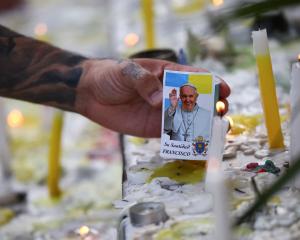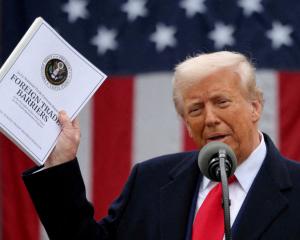If Geert Wilders were some underemployed bigot ranting in a pub, you'd just move away from him.
He calls the Islamic veil a head rag and says it should be taxed for polluting the Dutch landscape.
He condemns Islam as "the sick ideology of Allah and Mohammed" and the Koran as "the Mein Kampf of a religion that seeks to eliminate others".
Just another nutcase with too much time on his hands.
But Geert Wilders is no ordinary nutcase.
He is a Dutch member of Parliament and the leader of the Freedom Party, which came third in last June's election.
It was a pretty impressive third, with 24 of Parliament's 150 seats, so the other parties cannot ignore him.
They won't be able to ignore him even if he goes to jail, which is quite possible: his trial on five charges of inciting hatred and discrimination began in Amsterdam on Monday.
He'd probably quite like to be sent to jail for a little while, since that would further undermine the traditional Dutch political order and make Wilders a martyr for many people. (The penalties for inciting hatred are up to one year in prison or a $7600 fine.)
And he still wouldn't lose his parliamentary seat or the leadership of his party: the other party leaders would just have to negotiate with him in the prison visiting room.
Wilders first achieved global notoriety in 2008 with the film Fitna, which juxtaposed images of suicide bombings with verses from the Koran and depicted Islam as a force bent on destroying the West.
After that, his Freedom Party got lift-off, and last June it won 15% of the vote.
In the Dutch political system, that gives him real leverage.
The Dutch political scene is so fragmented that no party has achieved an overall majority in any national election since World War 1.
No single party has polled over 30% of the vote for more than two decades.
It's a system that often allows small, single-issue parties to wield influence far beyond their numbers - and this time it was Wilders' Freedom Party that won the prize.
The two traditional conservative parties ended up with only 52 seats between them, which meant they needed the Freedom Party's 24 seats even to achieve a paper-thin majority in the Dutch Parliament.
But how could they sit at the same table with a man who said such cruel and incendiary things about his Muslim fellow citizens? They solved their little problem by agreeing that the Freedom Party would vote for the new coalition government, but would not be an official part of it.
There was a price to be paid, of course: the new government would pass laws that sharply diminished the rights of Dutch citizens who happen to be Muslim.
Like most extremists, religious or otherwise, Wilders is obsessed with clothing, so burqas are to be banned altogether in the Netherlands if the deal holds.
Police officers and other government employees would not even be allowed to wear the Islamic head-scarf.
Immigration from non-Western countries would be halved, and the rules on granting political asylum to refugees made much stricter.
New immigrants would have to pay for their own mandatory citizenship classes and, even if they get Dutch citizenship, it could be cancelled if they commit any crime within five years.
The new citizens would also find it much harder to bring their spouses and children to the Netherlands and reunite their families.
This won't fully satisfy Wilders, who recently said: "I've had enough of Islam in the Netherlands; let not one more Muslim immigrate. I've had enough of the Koran in the Netherlands: forbid that fascist book."
But it's certainly a good start.
How can this be happening in the Netherlands, once seen as a bastion of liberty and tolerance? Have the Dutch all gone crazy? No.
What is happening is the result of an accident that sometimes happens in political systems like the Netherlands, which encourage a proliferation of small parties.
The Freedom Party doubled its vote in this year's election, partly because people are more likely to vote for a protectionist and xenophobic party in the midst of an economic crisis, but it still got only one-sixth of the vote.
That's the level at which anti-immigrant, anti-Muslim parties have peaked in other Western European countries like France, Belgium and Denmark.
It's actually less than what the predecessor to Wilders' party, the Pim Fortuyn List, polled in 2002.
There are xenophobes everywhere who can inflate a 6% Muslim minority into a threat to the nation's identity and safety, but they are not all that numerous themselves.
The Netherlands looks as if it has been taken over by the crazies, but what we are seeing is actually a random outcome, unlikely to be repeated, of the strict system of proportional representation.
If Wilders can turn this into a free speech issue (and he's trying), and especially if he goes to prison, then his support may expand beyond the traditional confines of the far right, but the Dutch really aren't nastier than everybody else.
The expanded and updated second edition of Gwynne Dyer's best-selling book Climate Wars was published recently in New Zealand by Scribe.













